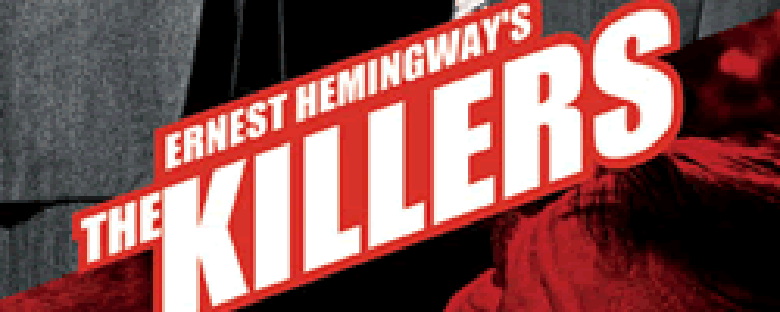Credits
Feature by: Rumsey Taylor
Posted on: 17 July 2004
Related articles:
reviews: The Killers (1946)
reviews: The Killers (1964)
Two men enter a diner and hold its occupants hostage. They will wait for one of its regular customers, and they will kill him.
“What’d he ever do to you?” asks the owner.
“He never had a chance to do anything to us,” says the larger of the henchmen. “He never even seen us.”
So opens Ernest Hemingway’s “The Killers,” a short story in which the targeted victim is warned of his own death and welcomes it. It is in completion an atmospheric and suggestive prologue in which a bulk of themes is introduced and left unresolved (in the author’s typical fashion). “The Killers” was written at the very threshold of Hollywood noir, a popular genre in which it would be repeatedly adapted.
The resulting adaptations expand greatly on the story — in a sense completing it. This is the triumph of a set by The Criterion Collection, which includes three filmed versions of the short story: Robert Siodmak’s and Don Seigel’s films (1946 and 1964), and Andrei Tarkovsky’s student film, made in 1956. The set is a myriad of various takes within a genre, and in whole contains isolated strengths that befit comparison.
Of the three Tarkovsky’s short is the most literal incarnation of the source material. It also displays the expanse of interest in the genre. Out of place in Russia, it is a rendition of material and style that is popularly American, yet within the expansive boundaries of film is an appropriate take. (The bullying vernacular is not befitted by a Russian drawl.)
The two-disc set is inclusive: Hemingway’s short story is available on the first disc, read by actor Stacy Keach. Paul Schrader’s 1972 essay “notes on film noir” examples the breadth of the genre, its conventions and emphasized style.
Each film is a component of a larger gesture, and in sequence displays the breadth and evolution of film noir across two decades; its beginnings drenched in atmosphere, and its end, a rough collection of familiar devices with little style (Siegel’s Killers has accidental camp value in Ronald Reagan’s casting as a crime boss).
Each has the lyrical dialogue, the menacing threats, the femme fatales, and the greed that drives every player involved.
The Killers
In respect to its source The Killers unfolds with meticulous patience, exposing a crime of interconnections and dense corruption. Hemingway’s short only hints at a complexity, and the film does well to manifest such a depth.
The Killers
Without pretension The Killers occupies its genre and welcomes each convention. It comes, however, late, and such convictions are worn for their familiarity.
We don’t do comments anymore, but you may contact us here or find us on Twitter or Facebook.



